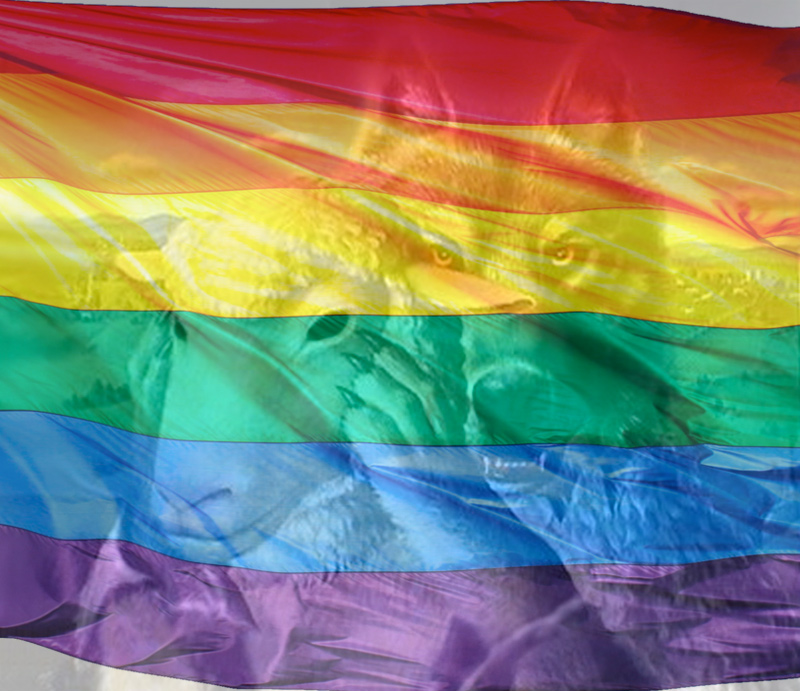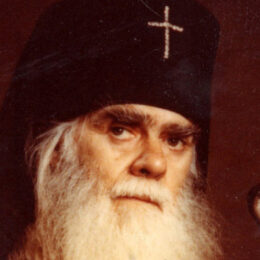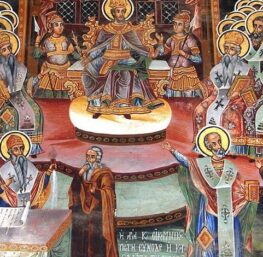 by Fr. John Parker (transcribed from video) –
by Fr. John Parker (transcribed from video) –
(The following excerpts were transcribed from a public video of Fr. John Parker’s presentation at the Digital Media and Orthodox Pastoral Care conference from June 2018. Topical headings and bolded words were added for emphasis.)
But the digital age also provides a greenhouse for what I would like to call anti-catechism: the subtle and not-so-subtle questioning of, for example, the moral teachings of the Orthodox faith. On the whole, this anti-catechism is unmonitored and, one hopes, not blessed for publication; and yet, with several examples, we can see the advancing of agendas simply unrelated to Orthodox personhood and the moral life.
Public Orthodoxy
What do we do, for example, with a site like Public Orthodoxy? Public Orthodoxy is, according to their website, “a peer-reviewed online publication produced for the Orthodox Christian Studies Center of Fordham University” in New York, whose “goal is to feature insightful, provocative op-ed pieces from scholars of Orthodox Christianity.” The blog is a main electric medium to “foster intellectual inquiry by supporting scholarship and teaching that is critical to the ecclesial community.” I’ll place my emphasis on “provocative” and “critical”.
Orthodoxy in Dialogue
A second online resource that captivates digital attention is Orthodoxy In Dialogue, which in 2017 according to its own report ranked in the top 60 Orthodox blogs on the internet. Orthodoxy In Dialogue considers itself a younger sister to Public Orthodoxy (mentioned above). In the essay “Same-Sex Love: The Church needs a conversation”, the anonymous authors and editors of the blog criticised Dr. Bradley Nassif for “not offering anything new” to the so-called conversation about homosexuality since he holds the Orthodox position that same-sex marriage and same-sex sexual activity both miss the mark and are contrary and immoral according to the Orthodox Christian tradition. The editors contrast his “unpastoral” spirit, as they identify his approach, to those of the radical Jesuit Catholic priest James Martin, S. J., who leverages his notoriety for consultant to the Vatican’s Secretariat for Communications where he promotes the acceptance and normalization of homosexuality.
The first Christians were clearly instructed that actions such as abortion and fornication are ways to death.
The Early Church’s catechesis was simple and direct. The well-known Didache, overwhelmingly accepted to date from the last decade of the first century, cites two ways to live: a way of blessings, a way of curses. A way to life, a way to death. “There is a great chasm between them”, it is written. The first Christians were clearly instructed that actions such as abortion and fornication are ways to death.
A century and a quarter later – circa 215 AD – Hippolytus of Rome penned On the Apostolic Tradition which delineates a straight path to the clear making of a catechumen. In his day, it was clear that one had to abandon sexual sins – among many other nonchristian behaviors – in order to enroll as a catechumen!
In the days of the fourth century pilgrim Egeria, as is accounted in her diary of Holy Week in Jerusalem (in the fourth century) one could not enroll as a catechumen without the personal testimony of one sponsor — before enrolling as a catechumen — that one had turned from immoral and sinful behaviors, having turned to Christ.
What is indisputable in the development of catechesis in the Early Church is an emphasis on four facets of Christian life. I call them Code, Creed, Services, Scriptures. That is, the moral life of the Christian, the dogmatic beliefs of Christianity, the mystagogical interpretations of the Church rites, and the knowledge of the Holy Scriptures.
self-professed teachers presume to challenge the moral teachings of the faith
False Teachers Within the Orthodox Churches
Today, a tidal wave of forces races towards us, not only from outside of the Church, whence we would expect a deluge against the Ark of Salvation, but also from within the Orthodox Churches, where self-professed teachers presume to challenge the moral teachings of the faith. I have mentioned and named but two of many notorious sources of this diabolical — in the technical sense, divisive — teaching. It subtly divides simply by raising “pastoral questions” related to love.
One-time evangelical Episcopalian bishop FitzSimons Allison from South Carolina (where I live) wrote a book entitled “The Cruelty of Heresy” in which he taught that accepting false teachings “does not soothe or save people by scratching their itching ears. Rather, he suggests, “indulging the heresy is cruel to them, for it “distorts the truth and distorts the image of our Lord Jesus Christ’, to borrow an image from St. Irenaeus of Lyons.” In today’s age of “finding pastoral solutions,” is it not also cruel vis-à-vis our role to teach the truth in love, to suggest to someone that he or she will not be judged by God for engaging in certain sinful behaviors, which Jesus himself defines as against life.
Public Orthodoxy, Orthodoxy in Dialogue and The Wheel which prowl around, wolves in sheep’s clothing, forming and shaping false ideas
The Wheel
The internet has become a place not simply of resources for faithful Orthodox Christians to read ancient texts or the lives of the Saints, it is in full swing a digital catechist; and while sites like OCA.org and Ancientfaith.com are repositories of significant and trustworthy catechetical material, there flourish unhindered sites such as Public Orthodoxy, Orthodoxy in Dialogue, and The Wheel which prowl around, wolves in sheep’s clothing, forming and shaping false ideas about the reality of our life in Christ. They are masters of promoting such agendas with passion; let the hearer understand.
___________________________________________________
Excerpts were transcribed from a public video of Fr. John Parker’s presentation at the Digital Media and Orthodox Pastoral Care conference in Crete from June 2018. Topical headings and bolded words were added for emphasis. Fr. Parker did not request or endorse their publication; he offered no explanation why.
Archpriest John E. Parker is an Orthodox priest in the Orthodox Church in America and the Dean of Saint Tikhon’s Orthodox Theological Seminary.
Video of Fr. John Parker’s presentation:
https://www.facebook.com/pemptousiagr/videos/1755527827857673/





to “miss the mark” is not unimportant, its a damn serious matter. In archery when this was written, this was not a mere entertainment sport etc., it was military training. you miss the mark in training you will miss the mark in real life and your life will end likely when the warrior you missed does NOT miss you. or you take out a fellow on your side by accident. (friendly fire.) or an innocent bystander. (collateral damage.)
Thank you very much, Fr. John, for this very needful alert! May we all be ever-vigilant to discern truth from error, wherever and whenever necessary, with the help of the Holy Spirit, the Spirit of Truth.
Thanks be to God for sites like Orthodoxnet and Orthodoxytoday and courageous Orthodox priests who are warning the Orthodox Christian people about these corrupt venues that spread falsehoods and errors.
The darkened “academics” and confused impostors who manage Public Orthodoxy, The Wheel, Orthodoxy in Dialogue prowl around seeking to lead astray others. They are dangerous and depraved wolves in sheep’s clothing who preach a false Christ and a false Gospel. These betrayers of the faith attack and contradict the true Orthodox Church teaching. They question and undermine the right Orthodox faith. Their evil works are unto condemnation.
Professor Ford is right “May we all be ever-vigilant to discern truth from error, wherever and whenever necessary, with the help of the Holy Spirit, the Spirit of Truth.”
Amen.
Fr. Ioannes Apiarius
Fr. John’s words are very much appreciated and so very necessary. God, in His Wisdom, put Fr. John in the perfect place as Dean to ensure the Truth is taught and held fast by the students studying for the priesthood.
May his courage spread like wildfire to other leaders so they may deal wisely with the priests and Orthodox laity who promote falsehood.
Thank you, Father John! Vigilance is not an option for us. It is required from us by Christ. And, it is also required from us to “discern spirits”. Many of them (the dark ones) today present themselves as the spirits of light.
Thank you for this enlightening and necessary statement of fact. Orthodoxy is becoming “popular”and as that happens, the perversion of Orthodox teaching becomes more evident. Orthodoxy has many enemies in the world and they will try to subvert its true message. Thank God for defenders of Orthodoxy like yourself.
“But the digital age also provides a greenhouse for what I would like to call anti-catechism: the subtle and not-so-subtle questioning of, for example, the moral teachings of the Orthodox faith……..What is indisputable in the development of catechesis in the Early Church is an emphasis on four facets of Christian life. I call them Code, Creed, Services, Scriptures. That is, the moral life of the Christian, the dogmatic beliefs of Christianity, the mystagogical interpretations of the Church rites, and the knowledge of the Holy Scriptures.”
Behind this “anti-catechism” (good word) is Secularism. Public Orthodoxy, The Wheel, and the like are just the outspoken and sophisticated (sometimes) expression(s) of secularism at work *within* the Body of Christ. It is not enough to simply call out their “wolves in sheep clothing” character for many reasons, not the least of which is that they are expressions of the what and how of a lived life of many many of the Faithful (at least half). As Florvorsky, Schmemann, Fr. Matthew Baker, and others have noted Orthodoxy’s recent encounter (only about 100 years old) with “secularism and its sources” as Fr. Matthew put it is a very significant and momentous thing – Schmemann even said it was going to be more impactful on the Body than the fall of Byzantium.
“Code, Creed, Services, Scriptures” yes, but how do you actually *form* a person with these things when the person is *formed* in the main Monday through Saturday by Secularism, which is more than just a “culture” and economic structure? Why was “Code, Creed, Services, Scriptures” successful at re-forming the Roman culture in the past, but our secular culture is successful at re-forming Christianity (even in its robust “Code, Creed, Services, Scriptures” manifestations) in the present?
As the father of a ten-year-old, I see how needful it really is for me to live as a faithful Orthodox Christian. It is also needful for me to `sit down` with my daughter and to speak with her about Christ and the teachings of the Church. When parents take the time to speak of Christ and struggle to live the Gospel, this has a great impact, and one that cannot be easily undone by `things they find on the internet`. What upsets me often is that many parents do not understand this at all, and think that`dragging` a child to Liturgy once a week is enough. (P.S. I graduated from St Tikhon`s in 2006.)
Thank you Fr. John for speaking the truth. If one hears that he is ok as he is, then why repent? If adulterers, homosexuals, or effeminate males are told they are fine as they are, then that message has precluded repentance. That is cruel. Love and permissiveness/acceptance are not the same thing. Also, we know from psalm 5 (how many are reading the psalms?) that God hates all workers of iniquity. He may receive our prayer, but not accept it. We also know that one cannot serve two masters….we will always hate one and love the other. The public schools, the media, and the internet have given many people an unhealthy education about sexuality. But what kind of education are they getting from the Church, when many in the parishes are so easily offended that a sensitive topic cannot be addressed? Parents become vulnerable to misinformation from outside…….perhaps they will stumble across the article above.
The bishops are asleep at the switch. Or are they AT the switch? At least one seems to spend more time telling about how cool Dylan and the Stones are. Thanks. Now what’s your job?
I’m super confused as to what’s going on here (I’m returning to the Church after a long period of eating pig husks and haven’t been paying attention to these things). I thought you must be exaggerating the situation, but then I read this piece by a Bryce Rich at The Wheel (which didn’t exist when I was in the Church) called “An Update For The Church.”
https://static1.squarespace.com/static/54d0df1ee4b036ef1e44b144/t/5e792b232695c13a6febbfcb/1584999207815/Wheel20_07_Rich.pdf
I thought this had to be some fringe group, but there is an OCA priest and a well known GOA priest on the advisory board? I’d read some articles about a fracas with the OCA priest from a few years ago. Thought that must have been resolved. But this Rich piece is from Fall 2019?
To what degree is what he espousing being taken seriously?
Am I missing something here?
Convert here. To all of our priests, deacons, monks, nuns, and most of all, bishops: Please, please fight the good fight and anathematize these secular fifth columnists. It seems like we are figuratively on the walls of Byzantium with traitors in our midst ready to throw open the gates. Where are the bishops? Where, dear bishops, is your witness? The ranks of the holy martyrs look upon you, and weep.